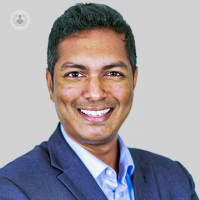How do you treat knee pain?
Autore:It's really important to see an orthopaedic consultant who specialises in the knees as soon as possible when you have pain as you really want to know what's wrong and what the treatment should be. In most cases, treatment certainly doesn't involve surgery but it involves rest, altering your activities and time, and taking simple painkillers. Seeing another type of health professional, such as a chartered physiotherapist or osteopath can help get you back on your feet.
The best starting point is seeing a specialist because we can give an early diagnosis. How do we do that? We talk to you and ask how you've injured your knee, finding out what the story is, what the mechanism of injury is, whether you've had any other knee, hip or other joint problems and your family history. We also assess your diet and overall general health.

We examine your knee and stress and strain all of the ligaments. We palpate and feel around to see if we can work out which tissues may be inflamed or injured. This is done very gently to ensure it doesn't hurt but it gives us an idea as to what's going on. We also examine your other joints such as your hips and lower back because sometimes problems up there can mimic problems in the knee. Lastly, we will generally send you for some tests or investigations. They normally involve an X-ray of the knee and sometimes an MRI scan, which is a really good form of imaging the knee and is non-invasive and has no radiation. This is why I think it's good for you to see your doctor early so that we can just set you on the right path.
How does a doctor treat knee pain?
Broadly speaking, an orthopaedic surgeon treats knee pain in two separate categories: treating you with an operation and treating you without an operation. This is the easiest way of categorising the treatments. Fortunately, most causes of knee pain, whether they're injuries or sort of slow onset knee pain, don't need an operation. Many of these injuries may just need lifestyle modification. If your knee's hurting when you do certain activities, you can try and do that activity less. However, that is not ideal and we want to get you back to doing the things you enjoy.
You may need to wear a special knee support or brace. It may be that you need some supplements or medication to help you get back to that activity. Sometimes you need an injection around the knee of either a substance that reduces inflammation, such as a cortisone shot, or we inject something that can help lubricate the knee and cause the knee to be more subtle, such as hyaluronic acid.
Physiotherapists are also excellent at treating knees without the need for surgery. They normally do that by helping you strengthen the muscles around the knee like the hamstring muscles and the quadriceps muscles and help the knee become more subtle with a better range of motion, which can often help too.
Now, in terms of surgery, the surgical treatments and other things that I like to do with my team, they are often either done through very small incisions (keyhole surgery) or we may sometimes decide to have a bigger operation if you need a knee replacement which, again uses less invasive incisions. We use all sorts of technology to help you get better and faster results, such as robotic-assisted surgery.
How can I prevent knee pain in the future?
Unfortunately, there's no guarantee that you can prevent getting pain going forward but there are lots of things one can do to reduce the risk of having problems with your knees. One of them is really to stay fit, strong lean and as active as possible, which is quite easy for some people.
For lots of people, it can be quite difficult with busy lifestyles and working a lot to stay in really good shape. I suggest to try and stay strong because having good strong muscles in your body, and particularly on the knee, really prevent injury and protect the knee from wearing away. A physiotherapist would be a great start for that as they can really advise and go through a bespoke rehab protocol for you that you hopefully stick to.
In terms of diet and supplements, I think if you can keep your weight down or to a certain good weight, that's excellent. Join a slimming club to help or see a dietician or nutritionist who can look at what you're eating. Having a really good balanced diet is important for your joints and we know that eating fatty fish and having lots of vitamins, milk and calcium all helps your bones and your joints. Also, sometimes taking health supplements that might contain things like glucosamine, chondroitin sulphate. You can often get those from health food shops and the form of tablets or powders. That can really help as well.
Some people will say that you should avoid impact sports like running and plyometric but I wouldn't advocate that as I think you should do what you enjoy. I think the benefits of staying active far outweigh the risks and certainly if you see me one of the things we try and do is just keep you doing the things you enjoy for as long as possible.


